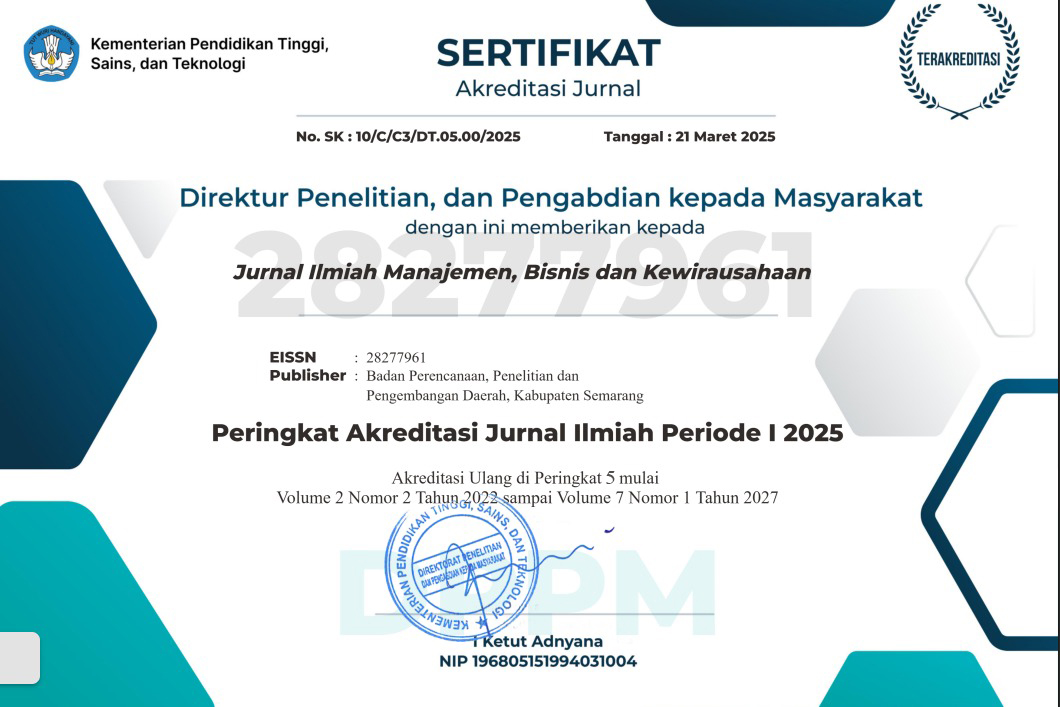Pengaruh Literasi Kewirausahaan, Locus Of Control, Self Efficacy, Kepribadian Entrepreneurship Terhadap Intensi Berwirausaha Mahasiswa FEB UPGRIS
DOI:
https://doi.org/10.55606/jurimbik.v4i1.723Keywords:
Literasi Kewirausahaan, Locus Of Control, Self Efficacy, Kepribadian Entrepreneurship, Intensi BerwirausahaAbstract
This research aims to examine the influence of Entrepreneurial Literacy, Locus of Control, Self Efficacy, Entrepreneurial Personality on the Entrepreneurial Intentions of FEB UPGRIS Students. This type of research uses quantitative research with primary data sources. This research used a sample of 305 respondents representing FEB UPGRIS students. The measurements for this research used a Likert scale which was processed with the help of IBM SPSS Statistics Version 26 using multiple linear regression. The research results show that: (1) Entrepreneurial Literacy has a significant effect on Students' Entrepreneurial Intentions. (2) Locus of Control has no significant effect on students' entrepreneurial intentions. (3) Self Efficacy has a significant effect on Entrepreneurial Intentions. (4) Entrepreneurship personality has a significant effect on students' entrepreneurial intentions.
References
Azwar, S. (2015). Sikap Manusia Teori Dan Pengukurannya. Yogyakarta: Pustaka Pelajar.
Bandura, A. (2010). Self Efficacy Mechanism in Psikological and Health Promoting Behavior. New Jersy: Prentice Hall.
BPS. (2022). Pengangguran Terbuka Menurut Pendidikan Tertinggi yang Ditamatkan (Orang) 2021-2022. Badan Pusat Statistik (BPS).
Hamedoglu, Kantor, & Gulay. (2012). The Effect Of Locus Of Control And Culture On Leader Preferences. Sciences International Online Journal of Educational, 4(1), 319–324.
Hasanah, U., Dewi, N. R., & Rosyida, I. (2019). Self-Efficacy Siswa SMP Pada Pembelajaran Model Learning Cycle 7E (Elicit, Engange, Explore, Explain, Elaborate, Evaluate, and Extend). PRISMA, Prosiding Seminar Nasional Matematika.
Hisrich, R. D., Peters, M. E., & Shepherd, D. A. (2013). Entrepreneurship. New York: McGraw-Hill Education.
Kholifah, S., & Koerniawan, I. (2022). Desain Sistem Informasi Pemasaran Produk Kewirausahaan Mahasiswa Program Studi Komputerisasi Akuntansi Universitas Stekom Semarang Berbasis Web Dan Mobile. Stability: Journal of Management and Business, 5(2), 137-147.
Khotimah, S., Mayasari, V., & Sunarko, B. (2017). Analisa Pengaruh Entrepreneurship Characteristic, Self Efficacy Dan Adversity Intelligence Terhadap Entrepreneurship Intensity (Studi Pada Pendidikan Ekonomi Unsoed). Prosiding Seminar Nasional Dan Call For Papers, 5(7), 17–18.
Koerniawan, I., & Wibowo, A. (2023). Blockchain Technology In The Perspective Of Public Accounting In Indonesia. @is The Best : Accounting Information Systems and Information Technology Business Enterprise, 8(2), 106-120. https://doi.org/10.34010/aisthebest.v8i2.11184
Kuntowicaksono. (2012). Pengaruh Pengetahuan Kewirausahaan Dan Kemampuan Memecahkan Masalah Wirausaha Terhadap Minat Berwirausaha Siswa Sekolah Menengah Kejuruan. Journal Economic Education, 1(1), 45–52.
OJK. (2022). Sambut Era Society 5.0, Angela Tanoesoedibjo: Generasi Muda Harus Pacu Kemampuan Digital Natives. Otoritas Jasa Keuangan (OJK).
Santrock, J. W. (2007). Psikologi Pendidikan Edisi Kedua, terj. Tribowo B.S. Jakarta: Kencana Prenada Media Group.
Sjarkawi. (2008). Pembentukan Kepribadian Anak, Peran Moral Intelektual, Emosional dan Sosial Sebagai Wujud Integritas Membangun Jati Diri. Jakarta: Bumi Aksara.
Sukidjo. (2005). Peran Kewirausahaan Dalam Mengatasi Pengangguran Di Indonesia. Jurnal Economica, 1(1), 1–13.
Suryana. (2013). Kewirausahaan: Pedoman Praktis, Kiat dan Proses Menuju Sukses. Jakarta: PT. Salemba Empat.
Sutrisno, Tannady, H., Heryadi, D. Y., Hanata, R. Y., & Gunawan, A. (2023). Analysis of The Role of Risk Tolerance and Personal Success on Entrepreneurship Motivation in Generation Z. Jurnal of Economic, Business and Accounting, 6(2), 1381.
Wijayanti, N., & Suryani, A. (2016). Perbandingan Faktor-Faktor Yang Memengaruhi Intensi Berwirausaha Mahasiswa FEB UNUD Dan Mahasiswa FEB Undiknas. E-Jurnal Manajemen Universitas Udayana, 5(3), 255071.
Yanti, A. (2019). Pengaruh Pendidikan Kewirausahaan, Self Efficacy, Locus of Control dan Karakter Wirausaha Terhadap Minat Berwirausaha. Maneggio: Jurnal Ilmiah Magister Manajemen, 2(2), 268–283. https://doi.org/10.30596/maneggio.v2i2.3774
Yuhendri, L. V. (2015). Perbedaan Minat Berwirausaha Mahasiswa ditinjau dari Jenis Kelamin dan Pekerjaan Orang Tua. Book of Proceedings Published.
Downloads
Published
How to Cite
Issue
Section
License
Copyright (c) 2024 Jurnal Ilmiah Manajemen, Bisnis dan Kewirausahaan

This work is licensed under a Creative Commons Attribution-ShareAlike 4.0 International License.










